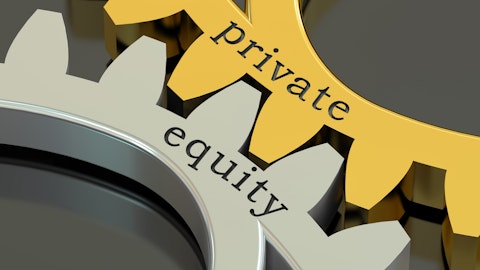If you are looking for the best ideas for your portfolio you may want to consider some of Greenhaven Road Capital‘s top stock picks. Greenhaven Road Capital, an investment management firm, is bullish on KKR & Co. Inc. (NYSE:KKR) stock. In its Q4 2019 investor letter – you can download a copy here – the firm discussed its investment thesis on KKR & Co. Inc. (NYSE:KKR) stock. KKR & Co. Inc. (NYSE:KKR) is an investment management company. The stock is up 1.0% since the Greenhaven Road Capital’s pitch in February 2020. On a year-to-date basis, KKR & Co. Inc. (NYSE:KKR) stock has risen by 16.9%.
On February 15, 2020, Greenhaven Road Capital had released its Q4 2019 Investor Letter. Greenhaven Road Capital said that KKR & Co. Inc. (NYSE:KKR) is expected to significantly grow its funds under management in 2020. This isn’t the first time Greenhaven Road Capital talked about KKR & Co. Inc. (NYSE:KKR) favorably either. The investment firm has been a long time KKR & Co. Inc. (NYSE:KKR) bull. A year ago we shared Greenhaven Road Capital’s bullish KKR & Co. Inc. (NYSE:KKR) thesis in this article.
Greenhaven Road Capital fund returned approximately 2% net in the fourth quarter and approximately 15.5% for 2019. The investment firm noted that its 2019 returns were below its benchmark the Russell 2000 Index.
Let’s take a look at comments made by Greenhaven Road Capital about KKR & Co. Inc. (NYSE:KKR) in the letter.
“KKR & Co. (KKR) – Our investment thesis in KKR remains the same. KKR will continue to be a beneficiary of the growth in private equity investments. Those who manage pensions and endowments need a credible path to 8% annual returns, which are not going to come from low-yielding bonds. 2020 should be a record fundraising year for KKR since three of their largest flagship funds – Asia PE, Americas PE, and Global Infrastructure – will be raising follow-on funds this year. The company also has 20 additional funds that will be out in the market raising capital in the next 3 years. KKR has a very high probability of continuing to grow assets and management fees over the same periods.
A common pushback on KKR and the other alternative asset managers is that the returns for private equity funds will go down as more money is invested into the PE space. This is very likely true; the 1980s and 1990s were a better time to be a limited partner in a private equity fund. However, our largest position is not an investment in a single KKR buyout fund. Rather, we own shares of the entity that benefits from management fees and incentive fees for all of the KKR funds in the market. While the absolute returns of the underlying funds may suffer as assets grow, management fees are guaranteed, and KKR manages 30+ strategies. Some portion of the various strategies will almost definitely generate incentive fees as well. We can argue about how many of the funds and how much per fund, but even if lower returns do happen, owning the corporate entity/general partner still makes sense. Our investment thesis is not that this is a great time to invest in private equity funds; the thesis is that KKR will make mountains of money off of the underlying funds as they grow AUM and incentive fees.
KKR has a very credible path to a doubling of management fees over the next five years. This past quarter, KKR raised another billion dollars in permanent capital, bringing the total to over fifty billion dollars as they also strategically extend the duration of the capital under management. In addition, KKR has so many nascent strategies that 80% of the firm’s incentive fees are coming from 30% of the total assets under management. As those funds mature, it is likely that many will begin contributing incentive fees to the overall pie as well. Trading in the low $30 range today, KKR has almost of $18 per share in cash and investments, implying a relatively modest sub-8X earnings multiple for the fund management business, which is growing fee-paying assets under management at midteens rates and has a very large incentive fee opportunity in front of it.”

TaLaNoVa/Shutterstock.com
In Q1 2020, the number of bullish hedge fund positions on KKR & Co. Inc. (NYSE:KKR) stock decreased by about 14% from the previous quarter (see the chart here), so a number of other hedge fund managers don’t seem to agree with KKR’s upside potential. Our calculations showed that KKR & Co. Inc. (NYSE:KKR) isn’t ranked among the 30 most popular stocks among hedge funds.
The top 10 stocks among hedge funds returned 185% since the end of 2014 and outperformed the S&P 500 Index ETFs by more than 109 percentage points. We know it sounds unbelievable. You have been dismissing our articles about top hedge fund stocks mostly because you were fed biased information by other media outlets about hedge funds’ poor performance. You could have doubled the size of your nest egg by investing in the top hedge fund stocks instead of dumb S&P 500 ETFs. Below you can watch our video about the top 5 hedge fund stocks right now. All of these stocks had positive returns in 2020.
Video: Top 5 Stocks Among Hedge Funds
At Insider Monkey we scour multiple sources to uncover the next great investment idea. There is a lot of volatility in the markets and this presents amazing investment opportunities from time to time. For example, this trader claims to deliver juiced up returns with one trade a week, so we are checking out his highest conviction idea. A second trader claims to score lucrative profits by utilizing a “weekend trading strategy”, so we look into his strategy’s picks. We read hedge fund investor letters and listen to stock pitches at hedge fund conferences. We recently recommended several stocks partly inspired by legendary Bill Miller’s investor letter. Our best call in 2020 was shorting the market when the S&P 500 was trading at 3150 in February after realizing the coronavirus pandemic’s significance before most investors. You can subscribe to our free enewsletter below to receive our stories in your inbox:
Disclosure: None. This article is originally published at Insider Monkey.




